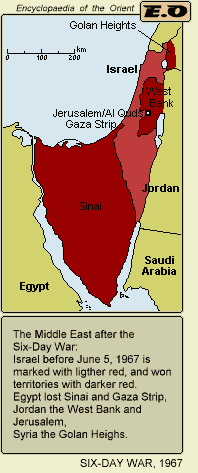 |
While the direct causes of the Six-Day War of June 1967 were Egypt's provocations directed against Israel, the war was, in a more profound sense, another battle of the wars of 1948-49 and 1956. The immediate causes of the war began with Syria's unconfirmed announcement in May 1967 that Israel was massing troops on its border. Seizing the opportunity to become involved, Egyptian President Nasser thereupon demanded the immediate withdrawal of the UN Emergency Force from the Israel-Egypt cease-fire lines, began massing troops in the Sinai, and closed the Strait of Tiran to Israeli shipping.
On May 30 King Hussein of Jordan signed a mutual defense pact with Nasser, convincing the Israeli cabinet that an Arab attack was imminent. Israel attacked first with a preemptive strike on June 5; the Israeli air force caught the Egyptian air force on the ground, largely destroying the Arab world's most effective military force. In Sinai in the following days the Israeli army smashed the Egyptian troops. King Hussein chose to enter the war; the price Jordan paid was the loss of East Jerusalem and the West Bank. Syria in turn suffered an Israeli frontal assault that pushed through the Golan Heights. By the time the UN Security Council managed to effect a cease-fire on June 11, Israel had won a spectacular military victory over all three of its opponents, gaining by its success a new sense of security from the fear of defeat.
|
